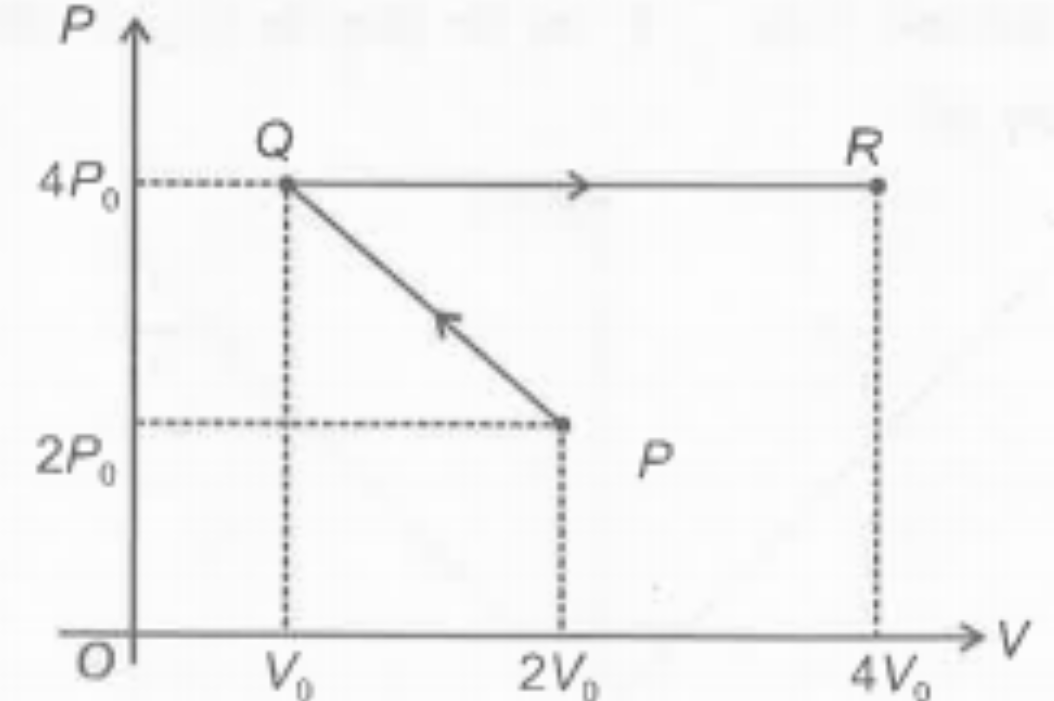An ideal gas undergoes a process in which PV−a = constant, where V is the volume occupied by the gas initially at pressure P. At the end of the process, rms speed of gas molecules has become a1/2 times of its initial value. What will be the value of Cv so that energy transferred by the heat to the gas is .a. times of the initial energy. (ΔQ=aPV)
(a2+1)Ra2−1
(a2+1)R(a2+1)
(a+1)R(a−1)
(a−1)R(a+1)
The correct Answer is:A
Topper's Solved these Questions
- BOOK - AAKASH SERIESCHAPTER - THERMODYNAMICSEXERCISE - LECTURE SHEET (EXERCISE - III (MORE THAN ONE CORRECT ANSWER TYPE QUESTIONS))3videos
THERMODYNAMICS
- BOOK - AAKASH SERIESCHAPTER - THERMODYNAMICSEXERCISE - LECTURE SHEET (EXERCISE - III (INTEGER TYPE QUESTIONS))5videos
THERMODYNAMICS
- BOOK - AAKASH SERIESCHAPTER - THERMODYNAMICSEXERCISE - LECTURE SHEET (EXERCISE - II (INTEGER TYPE QUESTIONS))5videos
THERMODYNAMICS
- BOOK - AAKASH SERIESCHAPTER - THERMAL PROPERTIES OF MATTEREXERCISE - ADDITIONAL PRACTICE EXERCISE (LEVEL - II) PRACTICE SHEET (ADVANCED) Integer/Subjective Type Questions2videos
THERMAL PROPERTIES OF MATTER
- BOOK - AAKASH SERIESCHAPTER - THERMOMETRY EXERCISE - Numerical Exercise (LEVEL- 1)11videos
THERMOMETRY
Similar Questions
An ideal gas undergoes a process P→Q→R as shown in pressure (p) - volume (v) diagram.The work done by the gas is
 View Solution
View SolutionAn ideal gas undergoes a process in which its pressure and volume are related as PVn=constant,where n is a constant.The molar heat capacity for the gas in this process will be zero if
View Solution
Knowledge Check
- Question 1 - Select One
An ideal gas undergoes a process in which PV−a= constant, where V is the volume occupied by the gas initially at pressure P. At the end of the process, 'rms' speed of gas molecules has become a1/2 times of its initial value. What will be the value of CV so that energy transferred in the form of heat to the gas is 'a' times of the initial energy.
A(a2+1)Ra2−1B(a2+1)R(a2+1)C(a+1)R(a−1)D(a−1)R(a+1) - Question 2 - Select One
A gas undergoes a process in which its pressure P and volume V are related as VPn= constant. The bulk modulus of the gas in the process is:
AnPBP1/nCP/nDPn - Question 3 - Select One
A gas undergoes a process in which its pressure p and volume V are related as Vnp = constant.The bulk modulus of the gas in this pressure is
Ap1/nBpnCnpDρn
An ideal diatomic gas with CV=5R2 occupies a volume (Vi at a pressure (Pi. The gas undergoes a process in which the pressure is proportional to the volume. At the end of the process, it is found that the rms speed of the gas molecules has doubles from its initial value. Determine the amount of energy transferred to the gas by heat.
View SolutionAn ideal diatomic gas with CV=5R2 occupies a volume (Vi at a pressure (Pi. The gas undergoes a process in which the pressure is proportional to the volume. At the end of the process, it is found that the rms speed of the gas molecules has doubles from its initial value. Determine the amount of energy transferred to the gas by heat.
View SolutionAn ideal diatomic gas with CV=5R2 occupies a volume V1 at a pressure P1. The gas undergoes a process in which the pressure is proportional to the volume. At the end of the process the rms speed of the gas molecules has doubled from its initial value.
The molar heat capacity of the gas in the given process isView SolutionAn ideal diatomic gas with CV=5R2 occupies a volume V1 at a pressure P1. The gas undergoes a process in which the pressure is proportional to the volume. At the end of the process the rms speed of the gas molecules has doubled from its initial value.
Heat supplied to the gas in the given process isView SolutionAn ideal diatomic gas with CV=5R2 occupies a volume V1 at a pressure P1. The gas undergoes a process in which the pressure is proportional to the volume. At the end of the process the rms speed of the gas molecules has doubled from its initial value.
The molar heat capacity of the gas in the given process isView Solution

